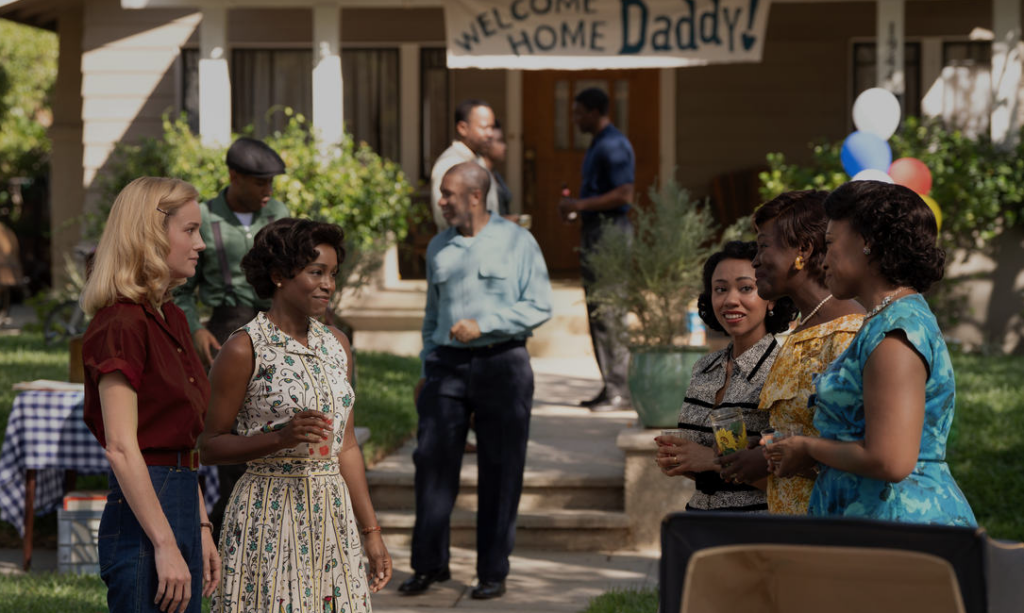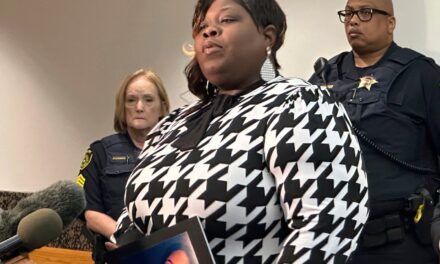On the surface, Lessons in Chemistry is about a brilliant white woman’s quest to be a scientist in the sexist world of the 1950s. What makes this story compelling, nuanced, and relevant is the series’ ability to authentically capture the power structure of American racism and sexism while humanizing all of the characters.
The main storyline of Lessons in Chemistry follows Elizabeth Zott (Brie Larson, Room) on her quest to be a scientist in a patriarchal society. One of the sub-plots involves Harriet Sloan (Aja Naomi King, How to Get Away with Murder), the friend and neighbor to one of Elizabeth’s co-workers Calvin (Lewis Pullman, Top Gun: Maverick). Harriet is the mother of two young kids; her husband Charlie (Paul James, The Path) is a military doctor serving in the Korean conflict.

Harriet and Charlie live in the Sugar Hill neighborhood in LA, an affluent Black neighborhood where famous Black actors like Hattie McDaniel and Louise Beavers, as well as Black doctors, lawyers, and other professionals, lived. In 1963, the mansion-filled Sugar Hill community was deemed a “blighted” neighborhood by the city and was bisected by the new Santa Monica freeway.
Harriet and Charlie’s journey is one we rarely see on TV and film, a happy, healthy, well-functioning, loving Black couple. Lessons in Chemistry is set in the 1950s and doesn’t ignore the realities of life back then. Harriet is dealing with the consequences of leaving law school to have a family as a military wife. She faces what so many smart married women deal with: putting their dreams aside to facilitate the success of the family.
It’s really a shame that it’s revolutionary to see a dark-skinned Black American couple dealing with this kind of conflict in a story told in the twenty-first century. I had the privilege of having two Black parents who were married for over 60 years. My dad was in the military, and my mom was a military wife. Watching Lessons in Chemistry was such a blessing for me because the moments that took place in the Sugar Hill neighborhood were like looking at the photo albums of my parents and older siblings in the late ’50s and early ’60s before I came along a little over a decade later.
Not only do we see how as a white woman Elizabeth figures out how to do what she was born to do while enduring patriarchy, but simultaneously, we see how Harriet has to deal with figuring out how to do what she was born to do while enduring patriarchy and systemic racism. On top of that, we witness how these two women find common experiences that create a realistic relationship in which Harriet is not a “Magical Negro” and Elizabeth is not a “White Savior.”
We get to see firsthand how Black people must deal with the challenges of everyday life, family dynamics, relationships, and systemic racism. While we are doing all of this, Black Americans still have the space and capacity to live embracing joy while playing spades, going to church, cooking incredible food, and coming together in community as activists.
Aja Naomi King’s physicality and voice melt away as she embodies Harriet believably. I instantly loved this character because she reminded me of my mother and her friends when they were young military wives living their best lives in the 1950s. Harriet has this beautiful fire in her belly that I saw in my mother and her friends that is at the heart of their descendants, who today are embodiments of their Black American dream.

Lessons in Chemistry is based on the New York Times best-selling book by the same name by Bonnie Garmus. Garmus is also credited with writing two episodes of the series. The writers include showrunner Lee Eisenberg (The Office), Elissa Karasik (The Marvels), and Susannah Grant (Erin Brockovich). These are some white writers who aren’t afraid of writing whiteness, including liberal whiteness, realistically.
I see so many TV shows and films produced, written, and cast by white folks who do performative diversity. We see Black and white characters on screen in relationship with one another, and the conflicts and challenges that come up in real life around race never appear. We see this fake colorblind storytelling.
Lessons in Chemistry doesn’t do that. This series is outstanding because it skillfully reflects the layers and nuances that human beings live in real life. People in this series make mistakes and are held accountable, and the relationships grow a little bit deeper. Lessons in Chemistry isn’t just a love story about romance; it’s a rich story about friendship, chosen family, duty, and community.
Lessons in Chemistry premieres October 13, 2023, on AppleTV+ and stars Brie Larson, Lewis Pullman, and Aja Naomi King.




